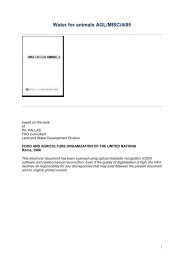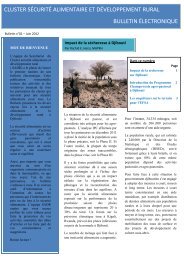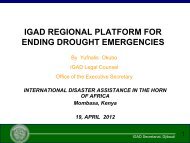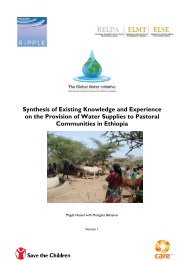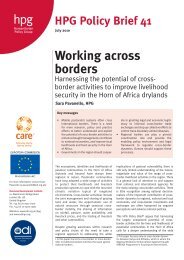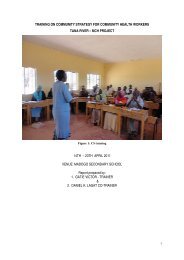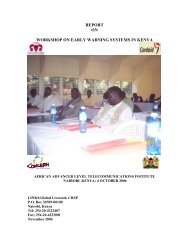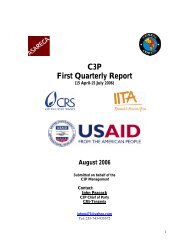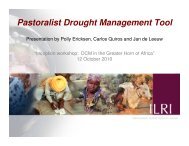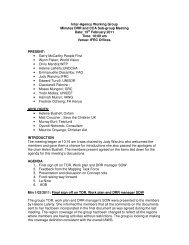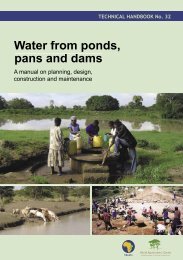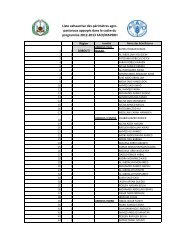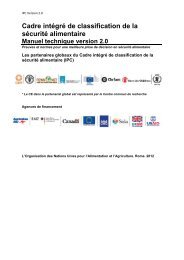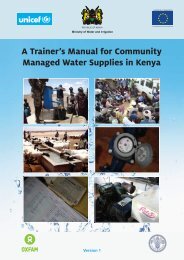CIK final RREAD Visibility Report.pdf - Disaster risk reduction
CIK final RREAD Visibility Report.pdf - Disaster risk reduction
CIK final RREAD Visibility Report.pdf - Disaster risk reduction
Create successful ePaper yourself
Turn your PDF publications into a flip-book with our unique Google optimized e-Paper software.
BUILDING PASTORALIST<br />
RESILIENCE AGAINST DROUGHT<br />
The impact of the Regional Resilience Enhancement Against<br />
Drought (<strong>RREAD</strong>) II project in the drought prone Mandera District<br />
of Northern Kenya: Evidence of Change Testimonies<br />
Documented by:<br />
Linda A Ogwell<br />
Development Communications Specialist<br />
Submitted to:<br />
CARE International in Kenya<br />
Livestock Sector.<br />
June 2010<br />
0
TABLE OF CONTENT<br />
I<br />
II<br />
II<br />
III<br />
Introduction<br />
About <strong>RREAD</strong> II<br />
The Impact<br />
Evidence of Change Stories<br />
1
SECTION I: INTRODUCTION<br />
Drought, famine, floods, poor infrastructure, poverty are some of the catch words that<br />
are normally used describe Northern Kenya.<br />
From an outsider, the picture looks grim: Despite the availability of huge livestock<br />
resources in these areas, the income derived from the sector and the benefits are<br />
declining, drought seems more frequent and the previous coping strategies like:<br />
mobility; keeping large herds and different species of animals, herd splitting during<br />
crisis; among others seem to have weakened.<br />
In addition, population pressure, high and widespread prevalence of livestock diseases,<br />
and lack of marketing networks have lowered the resilience of the pastoralist<br />
communities.<br />
On the other hand, pastoralism remains a dynamic and productive way of life with the<br />
herds providing diet staples of milk and meat and the sale of livestock enabling people<br />
to feed and educate their children.<br />
But still recent severe droughts and floods caused an enormous loss of livestock in the<br />
whole Horn of Africa. This loss was a hard blow to the economies of the countries in the<br />
region since pastoralism meets a significant proportion of their domestic meat and milk<br />
requirements not forgetting the enormous export earnings from the trade of livestock<br />
and hide.<br />
International funding agencies and national governments have over the years<br />
responded generously to these crises. One such response has been CARE<br />
International’s Regional Resilience Enhancement Against Drought (<strong>RREAD</strong>) Project<br />
funded by the European Commission Humanitarian Organization (ECHO).<br />
Resilience is all about the ability to bounce back after a tragedy or injury. <strong>RREAD</strong> works<br />
towards building the capacity of communities in areas that frequently experience<br />
drought to protect and manage their natural resources and prepare for drought and<br />
disasters through contingency planning. It also works with the communities to help them<br />
utilize livestock and livestock products to enhance their livelihoods. This project targets<br />
64,000 beneficiaries.<br />
2
SECTION II. ABOUT <strong>RREAD</strong><br />
The Regional Resilience Enhancement against Drought II (<strong>RREAD</strong> II)<br />
CARE International (CARE) received financial support from DG ECHO to fund a cross<br />
border (Southern Ethiopia and Northern Kenya) drought preparedness initiative, the<br />
Regional Resilience Enhancement Against Drought (<strong>RREAD</strong>).<br />
CARE International under the <strong>RREAD</strong> Programme recognizes the multi-faceted nature<br />
of livestock livelihoods vulnerability and applies a systematic approach that promotes<br />
drought <strong>risk</strong> <strong>reduction</strong> as a link between short term livelihood saving activities to long<br />
term livelihood protection.<br />
The overall aim of the Programme is to enable disaster <strong>risk</strong> <strong>reduction</strong> and<br />
resilience models relevant to the livelihoods of pastoralists in drought prone<br />
areas to be used and understood by local, national and international actors<br />
working in and beyond <strong>RREAD</strong> areas of operation.<br />
Expected Results<br />
1. Community structures and local government authorities able to implement<br />
appropriate drought (and other emergency) preparedness plans;<br />
2. Local and national actors engaged to manage the natural resources to mitigate<br />
against drought and other forms of crisis;<br />
3. Livestock based livelihoods supported to become more resilient to drought and other<br />
forms of crisis;<br />
4. Lessons learnt captured to feed into improved policy change and practice for<br />
drought <strong>risk</strong> <strong>reduction</strong> at district, national and regional levels.<br />
3
CARE KENYA’S AREAS OF OPERATIONS IN MANDERA<br />
Diagram courtesy of the CARE Kenya <strong>RREAD</strong> program.<br />
4
SECTION III: IMPACT<br />
<strong>RREAD</strong> has been operating in Northern Kenya for over four years and the impact has<br />
been greatly felt and appreciated from the Government level down to the grassroots.<br />
“Before CARE came into this area, I had a difficult time with my scarce resources<br />
and lean staff. There was no serious contingency plan in place in the whole<br />
province; so far, over ten communities have been trained in disaster<br />
preparedness and contingency planning” Donald Matumaini, District<br />
Development Officer (DDO), Mandera Central,<br />
<strong>RREAD</strong> has created awareness on the importance of Natural Resource Management.<br />
It has worked closely with the government through the Ministry of Environment, the local<br />
administration and the community elders to form <strong>Disaster</strong> Risks Reduction (DRR)<br />
committees who have set aside areas of pasture for rehabilitation, established grazing<br />
areas and rehabilitated water pans and boreholes.<br />
<strong>RREAD</strong> helped rehabilitate water pans. Photo: Linda<br />
Ogwell/CARE<br />
“This is a move towards the right<br />
direction, the communities are zoning<br />
areas for rehabilitation and slowly the<br />
concept of DRR is being institutionalized”<br />
says Enock Oruko, <strong>RREAD</strong> Program<br />
Manager, CARE Kenya.<br />
The DRR committees were formed to<br />
help with rangeland rehabilitation owing to<br />
the severe environmental degradation<br />
that has been going in the province.<br />
CARE linked the committees to<br />
Government forestry and environment<br />
department and also helped them by-laws<br />
that were endorsed by the local administration including the District Officer and the<br />
chiefs.<br />
“From now onwards, we won’t have to face the difficulty of migrating to far away<br />
land to look for pasture and water during drought. We will stay right here with our<br />
families and we won’t also loose so many animals to diseases or lack of pasture<br />
and water. Last drought season I lost almost 25 animals and that makes me<br />
really appreciate the rangeland rehabilitation and management initiative<br />
introduced to us by CARE” Ibrahim Abdi, Ogore DRR Committee Member.<br />
5
In addition, as a result of the failed long rains in April, <strong>RREAD</strong> prepared communities for<br />
drought by rehabilitating four boreholes and providing fuel and pump for 16 others.<br />
The Livestock Marketing Groups (LMGs) formed by the pastoralists were also given<br />
cash boosts to enable them buy more livestock from the farmers and their cost of<br />
transport to the markets like the Kariobangi Livestock Market in Nairobi was also<br />
subsidized. A total of 4000 animals were transported to Nairobi.<br />
The LMGs are aimed to assist in destocking before the drought season especially in<br />
areas with unavailable markets where the pastoralists normally have to walk for long<br />
distances.<br />
Members of a Marketing Group carrying out a transaction. Photo: Linda<br />
Ogwell/CARE<br />
“Every division (about 6-8 in<br />
total) now have access to a<br />
market and livestock off-take can<br />
be easily done by the groups.<br />
<strong>RREAD</strong> has provided a basic<br />
marketing system that if well<br />
institutionalized will provide<br />
market access to the<br />
pastoralists” explains Oruko.<br />
<strong>RREAD</strong> has also helped build<br />
the capacity of various district<br />
teams to respond to<br />
emergencies. This training has<br />
helped reduce the number of<br />
livestock dying from drought. For<br />
instance, during the last drought period, communities were more aware of signs of<br />
drought before it happened and most of them migrated to Ethiopia.<br />
In addition, the communities were introduced to the Savings and Loans Scheme to<br />
encourage a saving culture amongst them. “In an area with very few financial<br />
institutions and no access to loans, we thought it prudent to include the Savings and<br />
Loans Concept without charging of interest on the loans not only to help those in need<br />
access extra money but also provide a safety net for those who have emergencies”<br />
says Bashir Osman Isaak, Field Officer, CARE Kenya.<br />
The Milk and Meat Value addition activities were meant to balance the availability of<br />
milk throughout the year. Milk and meat are the staple foods of the communities in<br />
Northern Kenya and are in scarce during drought. Preserving them means that they are<br />
6
available during the whole year. This activity also helped in giving the women a source<br />
of income.<br />
Challenges<br />
Low literacy levels: The pastoralist communities are generally illiterate and this made<br />
implementation of some activities for example the training in business development<br />
skills like record keeping a big challenge. “Most of the groups rely on one person to<br />
keep their books meaning that they operate on trust” explains Oruko.<br />
The programme area is also very wide, diverse and sometime inaccessible making<br />
monitoring a challenge. Some areas are also far apart and with very little population.<br />
7
SECTION IV: EVIDENCE OF CHANGE<br />
STORIES<br />
Government Collaboration<br />
Government involvement and opinion is important for the success of any project.<br />
<strong>RREAD</strong> II allowed for close consultation and collaboration with key government officials<br />
in the implementation of its activities. Below are some of their experiences and lessons<br />
learnt while working with CARE International in Kenya (CARE Kenya) in the<br />
implementation of the programme.<br />
Working with CARE International in Kenya to Ensure that Pastoralists have<br />
access clean water: In the Words of Derow Hillow Mahat , the District Water<br />
Officer, Mandera Central District.<br />
Recorded and written by Linda Ogwell<br />
June 2010<br />
“I work with CARE Kenya in my capacity as a water specialist and government<br />
representative in charge of water issues in the district. We have constructed three water<br />
pans in Elele, Elram and Dololo here in Mandera Central of Northern Kenya, and these<br />
facilities have been operational since 2009.<br />
We also rehabilitated an emergency borehole in Quram Mudow that now serves the<br />
community well during drought seasons.<br />
I applaud what CARE has done in my<br />
district and more so for involving the<br />
government in the implementation of its<br />
programs. They have been good partners<br />
and we have established a good working<br />
relationship.<br />
Derrow Hillow Mahat, Distict Water Officer, Mandera<br />
Centra. Photo: Linda Ogwell/CARE<br />
opposed to three times before.<br />
Impact<br />
CARE’s work has brought some positive<br />
changes in this district in connection to<br />
water issues. Before we rehabilitated the<br />
pans, during the drought season, water<br />
would dry out within a month but now it’s<br />
available for two months, meaning that we<br />
now track water once for the community as<br />
8
Let me also add that in areas where we have the emergency boreholes, we no longer<br />
track water and this has reduced the burden on the government which is already short<br />
of resources. In addition, the quality of water in the pans after rehabilitation has<br />
improved leading to a <strong>reduction</strong> of water borne diseases in the area. CARE has helped<br />
fill the gap the government could not.<br />
My appeal to CARE is that they continue working with the pastoralist’s community<br />
especially now that the drop-outs have decided to settle near the water pan sites,<br />
meaning we will soon have additional trucking sites and yet our resources are very<br />
scarce.”<br />
9
Working with the Government to build Pastoralists Resilience to Drought<br />
Linda Ogwell<br />
June 2010<br />
Donald Matumaini is the District Development Officer (DDO) of Mandera Central. He<br />
has worked closely with CARE International in Kenya to help the pastoralist<br />
communities prepare for drought.<br />
“We have worked with CARE to train these communities on disaster preparedness, we<br />
also held joint planning sessions with the most vulnerable ones and after every three<br />
months we do a contingency plan focusing on preparedness “ explains Matumaini.<br />
“Before CARE came into this area, I had a difficult time with my scarce resources and<br />
lean staff. There was not a single contingency plan in place in the whole province,” he<br />
adds. So far, over ten communities have been trained in disaster preparedness and<br />
contingency planning.<br />
In addition CARE also worked with the District Livestock Officer (DLO) to establish and<br />
train livestock marketing groups in order to avert the mass death of livestock during<br />
drought. “I was involved in training of five pastoral producer groups and as a result we<br />
managed to save over 3600 heads of livestock during the severe drought witnessed in<br />
2009” explains Bernard Wanjoi, the District Livestock Officer.<br />
Wanjoi also worked with CARE on issues of Natural Resource Management. “We have<br />
worked together in issues of rangeland management and trained 16 communities on<br />
grazing management. This is because we realized that the grazing patterns were<br />
contributing a lot to the environmental degradation of this area” says Wanjoi. The<br />
grazing committees consisted of community elders working together with CARE and the<br />
local authorities.<br />
Wanjohi is grateful to CARE for involving him in the efforts to improve the lives of the<br />
communities he works with adding that government resources alone would not have<br />
achieved much. “Without <strong>RREAD</strong> these communities would be worse off. CARE has<br />
helped build their resilience to drought,” he adds “my office has a very small budget and<br />
I am glad CARE took up some of these activities”<br />
Future programming ideas<br />
According to Wanjoi, CARE should think of coming up with ways to strengthen livestock<br />
markets; this could involve establishing of a market in the region. “The nearest local<br />
market absorbs only 30 goats a day and pastoralists have to travel for around 300kms<br />
to get to the alternative one which is in Nairobi “concluded Wanjoi.<br />
10
Livestock Marketing Groups and Savings and Loans Groups<br />
Buladana Livestock Marketing Group.<br />
By Linda Ogwell<br />
June 2010<br />
Buladana is a small community near Elwak Town of Northern Kenya. It is inhabited by<br />
drop- out pastoralists who mainly practice small scale retail trade to make a living. In<br />
2006, twenty of these traders came together to form a self help group.<br />
“Inadequate capital and lack of business skills made our businesses stagnant and<br />
meaning we did not make enough to provide for our families - especially during drought<br />
when most of us would close down after using all our profits plus the capital. We<br />
therefore decided to come together and form a group as unity is strength” says Ibrahim<br />
Mohamed, the Chairperson of the group. Each member of the group contributed Kshs<br />
300 (About USD 4). “With this money we bought 87 goats and sold them within Elwak”<br />
says 31 years old Mohamed.<br />
In 2008, CARE International in Kenya under the ECHO funded Regional Resilience<br />
Enhancement Against Drought (<strong>RREAD</strong>) II program, identified the group as a<br />
beneficiary and the members received training in Business Development Skills which<br />
included basic book keeping, profit and loss analysis, marketing practices and<br />
veterinary policies. CARE also trained the group on how to run their group (group<br />
dynamics).<br />
“CARE targeted this group not only to help them improve their business operations but<br />
also because their success would provide a ready livestock market for pastoralists in<br />
this area so that they don’t have to walk for long distances especially during drought,”<br />
explains Anne Daki, Livestock and Livelihoods Officer, CARE International in Kenya.<br />
In addition, CARE also subsidized the transport cost for the group to take their produce<br />
to Kariobangi market in Nairobi, one of the biggest goats and sheep (Shoats) market in<br />
the region.<br />
“CARE gave us a big boost. We started small by trading within our town, but now we<br />
sell about two to three lorries (about 240 shoats) a month to Kariobangi, this is a big<br />
achievement for us and we are truly grateful” adds Mohamed.<br />
According to the group members the training by CARE has also helped them improve<br />
their individual businesses. “Before the training, I kept no records and I would use up all<br />
the profits I made without reinvesting back in the business, but now I know better” adds<br />
11
Mohammed “My Hotel business is now flourishing and I can now pay school fees for my<br />
children.”<br />
Members of Buladana Livestock Marketing Group. Photo by Linda Ogwell/CARE<br />
Group and Savings Loan<br />
The group also formed a savings and Loans scheme to help them put aside some<br />
money as savings and also allow members to have access to loans. They named the<br />
savings and loans scheme Al-Barak to give it identity and separate it from the livestock<br />
trading venture.<br />
“In our area we have no access to financial institutions that can give us loans unless we<br />
travel to major towns like Garissa which are hundreds of kilometers always” explains<br />
Mohamed.<br />
According to Jane, the group was encouraged to form the savings and loans scheme<br />
not only to provide financial access in form of interest free loans but also provide a<br />
social safety network for those in need.<br />
12
“We trained the group on how to run a savings and loan schemes. The training included<br />
how to set- up a social fund to help members in need especially during emergencies like<br />
death and diseases “ adds Jane “ members were also encouraged to borrow from the<br />
group in order to expand their individual retail business.”<br />
In the beginning, each member paid a contribution of Kshs 300 (About 4 USD).<br />
However every month the members pay Kshs 950 (USD 11) into savings kitty and about<br />
Kshs 70 (about a dollar) for the social welfare kitty.<br />
Members can access loans in turns and according to the seriousness of their situation,<br />
and are given a maximum of three months to pay back. “We are very strict in ensuring<br />
that our members pay back the loans and we have fines for those who renege” explains<br />
Mohamed.<br />
The group is full of praise for CARE. However they would like more training in business<br />
management. “The training has helped us uplift our community because we passed on<br />
the information we got to others who are not part of our group and we are looking<br />
forward to many more so that we can grow stronger” concludes Mohammed.<br />
13
Being part of the Group has helped improve my life: A story in the words of<br />
Mohamed Ali.<br />
Recorded Written by Linda Ogwell<br />
June 2010<br />
Mohamed Ali from Buladana. Photo: Linda Ogwell/CARE<br />
“My name is Mohamed Ali and I am 49 years old. I have two wives and 12 children<br />
between the ages of two to 21. I am from Buladana village, near Elwak Town of<br />
Mandera District in Northern Kenya. I am a small scale trader selling shoats, groceries,<br />
soap, salt and cereals to help feed and educate my children.<br />
I decided to settle into a sedentary lifestyle after I lost a lot of livestock to drought. I<br />
realized that the water sources were becoming more scarce with every drought season<br />
and this meant that I had to walk longer distances to find pasture and water for my<br />
livestock not to mention the diseases and danger that I faced while on the road. I had to<br />
look for an alternative way of survival.<br />
Currently I have about 30 goats and four cows. When I saw how well my friends who<br />
were part of the Buladana Marketing Group were doing, I decided to join them and that<br />
14
is one of the best decision I have ever made in my life. Working as a group has made<br />
me part of a bigger venture that I would not have been able to afford. We now sell our<br />
shoats to bigger markets like the Kariobangi Goat Market in Nairobi, which is one of the<br />
biggest in this country.<br />
I am grateful to CARE for the training in business skills and how to operate as a group<br />
including how to run meetings and elect our leaders. I am also grateful to CARE for<br />
introducing to us the idea of forming a savings and loans group to help us put aside<br />
some savings.<br />
I am now very knowledgeable in business management and I have applied this<br />
knowledge in running my business. Even though am not highly educated, I can count<br />
money, and now I can tell if I am making profits or losses, I also learnt not to spend all<br />
my profits but reinvest into the business.<br />
I took a loan from the group and paid for my children’s school fees, something I would<br />
not have been able to do had I not been a part of the group. But the most memorable<br />
help I got was when I was unwell and could not afford treatment, the group gave me<br />
money to get treatment and to also feed my family while I was sick. This is something I<br />
continue to be grateful for every day and now I know in my heart that when I have a<br />
problem, I will get help.<br />
I intend to borrow some money and use it to improve my business. Being a part of this<br />
group has made renew my will to live; I am now full of hope.”<br />
15
I have learnt that working in a group is better than struggling alone: The story of<br />
Ahmed Mohamed.<br />
Recorded and Written by Linda Ogwell<br />
June 2010<br />
Ahmed Mohamed. Photo by Linda Ogwell/CARE<br />
“My name is Ahmed Mohamed and I am 25 years old with a wife and two children. I live<br />
in Buladana and I am a member of the Buladana Livestock Marketing Group and also of<br />
Al-Barak savings and loans group.<br />
I dropped out of pastoralism and I went to Mombasa to find work where I started selling<br />
essential household goods in a tiny shack in one of the slums. However, the business<br />
was taking me nowhere, so I decided to come back home, settle down and marry.<br />
When I got here I started trading in traditional medicine that I got from the remote<br />
bushes nearby. This was not enough for us to live on; I would only make Kshs 70 per<br />
day (about USD 1).<br />
16
When I heard of the Livestock Marketing Group I decided to join them. I believe that<br />
working in a group is far much effective than struggling on your own.<br />
As a group we were trained in various skills by CARE International in Kenya: these<br />
included business skills, how to work as a group and run our affairs effectively, issues of<br />
licensing and taxation policies. The training I got opened my eyes. Before I would run<br />
my business with no skills, I was just wading through, no wonder I made very little profit.<br />
I now have five cows and 20 goats and can provide for my family. I also took a loan to<br />
open a retail shop here in Buladaran. Being part of the Savings and Loans has also<br />
helped many members grow their businesses and improve their livelihoods. The social<br />
fund is also very useful in helping us offset emergency bills.<br />
We have grown as a group and we are very grateful to CARE for all the help given to<br />
us. For the first time we can now sell our shoats to the biggest market in the country - in<br />
Kariobangi, Nairobi. CARE subsidized fuel costs for two trips to the market and we were<br />
able to make business contacts.<br />
Our request is for CARE to continue with the trainings especially on issues of animal<br />
health, so that we know how to handle our sick animals. We would also like more<br />
trainings in business skills since some of our members are not literate and it takes them<br />
long to learn some of the concepts.<br />
We hope to increase our savings to good proportions that will help us strengthen our<br />
business and build our community. We cannot go back to being without hope, we<br />
cannot turn back. Now we can only move forward.”<br />
17
MWANZA Livestock Marketing Group<br />
By Linda Ogwell<br />
June 2010<br />
Mwanza Livestock Marketing Group was formed in 1996 with only five members each<br />
contributing Kshs 3000 (USD 40) to trade in shoats and hide. The membership later<br />
grew to 25 with each member paying a monthly subscription of Kshs 1500 (USD 20).<br />
“We started as a small unit because most people didn’t realize that working in a group<br />
would be better than struggling alone; as a group you have a bigger capital base” says<br />
Ali Ibrahim, the 35 year old chairman of the group.<br />
In 2009, CARE International in Kenya under its ECHO funded Regional Resilience<br />
Enhancement Against Drought (<strong>RREAD</strong>) II program identified the group as a beneficiary<br />
and trained its members who consist of 10 women and 15 men on business<br />
development skills and group dynamics.<br />
Some of the members of the Mwanza Livestock Marketing Group. Photo by Linda Ogwell/CARE<br />
“CARE trained us on how to run our business, record keeping, and profit and loss<br />
analysis and also how to run our group including setting meeting dates and agenda and<br />
electing our leadership” explains Ibrahim.<br />
18
In addition to the training, CARE also paid for the group a percentage of the fuel cost to<br />
transport the livestock to the Nairobi Kariobangi Market, one of the biggest livestock<br />
market in the country. CARE did this two times.<br />
The group’s business has improved and currently their assets are in the tune of Kshs<br />
370,000 (About USD 3500). “CARE opened our eyes and we have improved even in<br />
our own personal business ventures” says 28 year old Abdul Rashid, a member of the<br />
group.<br />
The women in the group are also appreciative of all the exposure and training they have<br />
received. “As women we have benefitted because we have learnt a lot, we are now part<br />
of a great venture that we would not have managed to start on our own as a lot of our<br />
time is spent taking care of our families” explains 30 year old mother of seven, Fatuma<br />
Adam.<br />
Savings and Loans<br />
CARE also encouraged the members of the group to form a savings and loans group to<br />
assist them in times of need and give them access to financial services. “As Muslims we<br />
cannot get loans from the commercial banks as they charge interest and that is against<br />
our religion” says Ibrahim “the group members were therefore very open to forming the<br />
savings and loans groups and all our members are part of it.”<br />
The group decided that they would put aside part of the profits from the livestock trade<br />
into the savings kitty. This fund has helped the members pay school fees for their<br />
children and build up their individual business.<br />
“I have really benefited from being part of this group, I recently took a loan of Kshs<br />
100,000 (About USD1500) to expand my business, and I used it to move into a better<br />
and bigger business premise and also to increase my stock. This is something I would<br />
not have been able to do had I still been operating alone” says a happy Abdul Rashid<br />
Mohammed.<br />
The group has faced a few challenges including market price fluctuations, inaccessible<br />
roads, livestock diseases and illiteracy amongst the members. However, the members<br />
are very grateful to CARE for the trainings and introducing to them the savings and<br />
loans concept. They hope that they will get more training in livestock diseases and also<br />
literacy classes for some of their members.<br />
“CARE woke up the giant in us to succeed and now there is no going back, we are<br />
going to grow bigger and bigger and improve our community” concludes Ibrahim.<br />
19
I now have an alternative source of livelihood: The story of Fatuma Isak.<br />
Recorded and Written by Linda Ogwell<br />
June 2010<br />
“My name is Fatuma Isak and I am a<br />
50 years old mother of eight. I run a<br />
butchery here in Elwak Town. I have<br />
been doing this since we lost over<br />
300 livestock to drought. This<br />
business has been my source of<br />
livelihood.<br />
I joined Mwanza Livestock Marketing<br />
group in 2007 to have an alternative<br />
source of income. Furthermore, am<br />
getting old now and not as active as I<br />
used to be and so I thought it wise to<br />
combine my effort with others so that<br />
I can grow more.<br />
Fatuma Isak in her butchery. Photo: Linda Ogwell/CARE<br />
As a butcher, there times when I<br />
have no business, especially during<br />
drought when most people lose the<br />
animals to disease or migrate in<br />
search of pasture and leaving me<br />
with no business.<br />
However being part of the group has helped me especially during this time since I can<br />
access loans and at times shares of the profits.<br />
As a sole provider for my family sometimes I have money related emergencies and<br />
being part of a group has helped cushion me during these times. I have also been able<br />
to educate my children with the help of the group’s savings and loans venture. For me<br />
this has been the greatest achievement because I did not get an education but when I<br />
look around all the successful people around me are those who got some education.<br />
I vowed a long time ago that I would educate all my children because I want them to be<br />
successful. My eldest son is almost done with his education and he has a business<br />
mind so I hope that he will join me in running the business.<br />
20
I am so grateful for the trainings by CARE International in Kenya. As much as am not<br />
educated, I have learnt to tell whether my business is making a profit or loss and I<br />
sometimes ask the other group members to help me with the book keeping.<br />
Thank you CARE, you brought hope to our families and community and we hope that<br />
this bond that we have formed will continue."<br />
21
From selling products on a table to my own shop: The story of Abdul Rashid<br />
Mohammed.<br />
Recorded and Written by Linda Ogwell<br />
June 2010<br />
Abdul Rashid at his new shop. Photo: Linda Ogwell/CARE<br />
My name is Abdul Rashid Mohammed; I am 28 years old and a father of four children. I<br />
run a retail shop in Elwak town and I am also a member of Mwanza livestock Marketing<br />
group and its affiliate savings and loans group.<br />
I joined the group three years ago and I can say that I have seen a lot of difference in<br />
my life after joining the group. CARE International in Kenya trained us in business skills<br />
and introduced us to the concept of saving and loans, and this was an eye opener for<br />
me.<br />
Before this I did not know how to handle my profits and so my business could not grow.<br />
I kept no records and was not reinvesting back into the business. However after the<br />
22
training and exposure to business skills things have changed and I even opened a bank<br />
account.<br />
I have always wanted to expand my business and move from a small retail shop to a<br />
fully grown business in a good respectable premise. But due to lack of financial access I<br />
could not do this because as a Muslim I cannot borrow from the banks since Sharia<br />
laws forbids me from charging or paying interest.<br />
I was therefore very grateful with the idea of a savings and loans scheme and as soon<br />
as I could, I borrowed Kshs. 100,000 (USD 1500) to help me expand my business. With<br />
this money I moved into a bigger and better premise and also increased my stock. I am<br />
now one of the biggest traders in El –Wak town and this is a dream come true for me.<br />
As a group we are now planning to buy a lorry since hiring one is not so cost effective.<br />
We are so grateful to CARE for the help and the opportunity they gave us to improve<br />
our lives because otherwise I would still be selling my little produce in a small shack and<br />
my children’s future would be grim. Thank you CARE for opening my eyes.”<br />
23
RAHA Savings and Loans Group<br />
By Linda Ogwell<br />
June 2010<br />
Before 2009, El-Ram community members had no access to credit or financial services<br />
as the nearest bank is over 70 kilometres in El Wak town of Northern Kenya and<br />
secondly because their Islamic religion does not prescribe to the practice of charging<br />
interest on loans, which is done by all commercial banks in Kenya.<br />
However with the help of CARE International in Kenya under the ECHO funded<br />
Regional Resilience Enhancement Against Drought (<strong>RREAD</strong>) II Project helped 12<br />
members from the community (8 women and four men) form RAHA Savings and Loans<br />
Group.<br />
“We formed RAHA to help us overcome poverty and provide for our families” explains<br />
54 years old Amina Ahmed, a member of the group. The group members each<br />
contribute Kshs 200 (USD 2.5) monthly.<br />
CARE trained the members on group dynamic and how to run a savings and loans<br />
groups. “When we formed the group we thought that every month we would collect<br />
money and give a member and they didn’t have to pay it back, we didn’t understand the<br />
loaning concept” explains Amina.<br />
The group was also trained on how to hold elections and how to set-up meetings.<br />
Currently members can get as much as Kshs 8,000 (USD 100) and must refund it in<br />
three months with a penalty of Kshs 250 (USD 3) for anyone who defaults. “So far we<br />
have given two members of our group loans and four more have requested and will<br />
soon be given” says Amina.<br />
According to Amina, once the group’s savings have grown, they will be able to give<br />
more money. This venture has been of great help to the group members especially<br />
during drought.<br />
“During drought we have to buy livestock feed and spend extra money on our food,<br />
when in need we borrow money from the group” says 35 years old Ahmed Mohammed,<br />
a member of the group and a small scale shoats trader.<br />
The group is full of gratitude to CARE for introducing them to a concept that has given<br />
them hope for the future.<br />
24
MAENDELEO Savings and Loans Group<br />
By Linda Ogwell<br />
June 2010<br />
Maendeleo Savings and Loans Group was formed in 2008 by 10 members to collect<br />
money and give to members who were in need. The members would each contribute<br />
Kshs 400 (USD 5.5) every month and this money would then be given to a member<br />
according to the seriousness of their situation or need.<br />
“We would look at who needed the money most and give it to them, however the<br />
member was not required to pay back this money” explains 40 years Ibrahim Isaak,<br />
chairman of the group.<br />
In 2009 CARE International in Kenya under the ECHO funded Regional Resilience<br />
Enhancement Against Drought (<strong>RREAD</strong>) II program trained the group on the concept of<br />
Savings and Loans, record keeping, basic accounting and group dynamics.<br />
“As much as this group contributed money every month, they had no savings! We<br />
helped them learn to save in order to put aside some money for emergencies like<br />
drought” explains Jane Daki, CARE Kenya’s Livestock and Livelihoods Officer.<br />
All the members of the groups received this training and soon afterwards they changed<br />
the way they were operating. “First we split our money into savings and loans. Every<br />
month we would decide on how much to put aside as savings and as money for loaning”<br />
explains Isaak.<br />
With the help of CARE, the group also set–up the dynamics of collecting and returning<br />
the money. “We decided that by the 5 th of every month the members should have paid<br />
all their monthly contributions and the payback period a month” explains Isaak.<br />
Members of the group can get as much as Kshs 10,000 (USD 150). “We have loaned<br />
money to over 10 people to pay fees, hospital bills, buy food among other issues” he<br />
adds “Currently we have a total of Kshs 90,000 (USD 1400) in savings.”<br />
The members are grateful to CARE for all the assistance. “This is the most important<br />
venture I have ever joined; this year I borrowed money to pay school fees for my son<br />
who is in his <strong>final</strong> year, all this thanks to CARE” says 38 years old Musa Adan, a<br />
member of the group.<br />
Members are now more hopeful and are ready to face the next drought season. “We are<br />
no longer scared of drought. We know that we can now borrow money and buy livestock<br />
during this period when prices are low, fatten them and sell them when the prices<br />
improve. Thank you very much CARE” concluded Isaak.<br />
25
OGORE Livestock Marketing Group<br />
By Linda Ogwell<br />
June 2010<br />
Ogore Livestock Group was formed in 2003 by 11 members, all from Ogore Village in<br />
El-Ram town of Mandera district of Northern Kenya. This village consists mainly of drop<br />
out pastoralists who ventured into small scale retail businesses to earn a living.<br />
“Individual businesses were not bringing in good returns due to our small capital base,<br />
but as a group, you put your resources together for a bigger capital base, that is why we<br />
formed the marketing group” explains 59 years old Musa Adan, a member of the group.<br />
In 2008, under the ECHO funded Regional Resilience Enhancement Against Drought<br />
(<strong>RREAD</strong>) II Program, CARE International in Kenya identified the group as a beneficiary<br />
and trained them on business skills development including basic accounting and record<br />
keeping.<br />
CARE also subsidized their fuel cost to transport two lorry loads (about 300) of shoats<br />
to Kariobangi Market in Nairobi - one of the biggest shoats market in the country. “We<br />
used to sell 50 shoats a day but our number has increased to a full lorry of about 130<br />
shoats and we do this two times a month ; all this thanks to the assistance from CARE”<br />
says Adan with appreciation.<br />
The sales of the group have increased especially during drought. “We provide a ready<br />
market for pastoralist around our communities to sell off their excess stock during<br />
drought” explains Adan.<br />
Initially member of the group would contribute Kshs 300 (USD 4.5); this increased to<br />
Kshs 500 (USD 7). The group<br />
shares profits once in a while to<br />
encourage the members continue<br />
investing into the group.<br />
Members of Ogore Livestock Marketing Group. Photo: Linda Ogwell/CARE<br />
“We pay something small to our<br />
members once in a while when we<br />
make good profits. Last month we<br />
gave them each Kshs 500 for them<br />
to feel like their sweat is paying off”<br />
explains Adan.<br />
26
The group’s leadership consists of a Chairman, Secretary, Treasure and three<br />
committee members. They meet after every sale to discuss how to utilize the profits and<br />
currently they have Kshs 200,000 (USD 2500) as savings.<br />
Some of the challenges the group faces include high fuel costs due to poor road<br />
infrastructure and fluctuating market prices. “We have challenges but we are at a much<br />
better place than before and thank you very much CARE, we hope that one day we will<br />
receive more training in other business ventures like bee-keeping” concludes Adan.<br />
27
Wargadud Livestock Traders<br />
By Linda Ogwell<br />
June 2010<br />
Wargadud Livestock traders group started out by selling hides and tree gum to the<br />
neighbouring town of El-Wak located in Mandera district of Northern Kenya.<br />
“We would get gum and hides from our village and take to El-Wak, however we had<br />
to stop when the rains destroyed the gum and the hides became rare” explains 44 years<br />
old Habiba Osman, a mother of ten children and a member of the group.<br />
The group was formed in 2006 with a membership of ten; four women, six men. Each<br />
member had to contribute a registration fee of Kshs 2500 (USD 30). In 2009 CARE<br />
International in Kenya under its ECHO funded program, Regional Resilience<br />
Enhancement Against Drought (<strong>RREAD</strong>) II trained the group members in business<br />
development skills and how to work as a group (group dynamics).<br />
“Before CARE we kept no financial records and had no leadership structure, we were<br />
operating haphazardly” explains 68 years old Muhammad Ali, the Chairman of the<br />
group.<br />
CARE also subsidized the fuel cost to enable the trader transport their livestock two<br />
times to Nairobi’s Kariobangi Market, one of the biggest shoats market in the region.<br />
“The fuel subsidy from CARE was a big boost to our group since high transport costs<br />
and unstable fuel prices are some of our biggest challenges” says Ali.<br />
The group meets after every major sale and elects their leaders comprising of a<br />
chairman, secretary and treasurer every year. They stock from the community<br />
members. “During drought we provide an accessible and ready shoats market and so<br />
the pastoralists don’t have to travel for long distances and lose the livestock in return”<br />
says Ali.<br />
Sometimes when the sales are good, the group divided shares of the profits amongst<br />
the members as a bonus. “When we make good sales we share this with the members.<br />
So far we have done this two times, each time a member getting Kshs 5000 (USD60)<br />
and the members were elated” explains a beaming Ali.<br />
The group is very grateful for all the help CARE has given them. “Before I had very little<br />
knowledge on running a business, after the training, my small retail business has<br />
improved and last year I made enough profit to help pay school fees for my son who is<br />
28
in his <strong>final</strong> year of education” admits Habiba Mohamed, a member of the group and a<br />
mother of seven.<br />
Some members of Wargadud Livestock Marketing Group. Photo by Linda Ogwell/CARE<br />
The group has put aside a total of Kshs 450,000 (USD 5500) which they hope to use to<br />
expand their business and start trading in camel and cows too. Things have certainly<br />
been going well for this group and now all they are requesting for is more training in<br />
business skills and sponsorship for learning visits to more established groups in the<br />
region.<br />
29
Shimbir Fatuma Livestock Traders: In the words of Guracha Adan, Chairman of<br />
the Group<br />
By Linda Ogwell<br />
June 2010<br />
“My name is Guracha Adan, I am 40 years<br />
old and the chairman of Shimbir Fatuma<br />
Livestock traders. We formed this group in<br />
2003 and by then we were only ten, but now<br />
our membership has increased to 20.<br />
We started this group to provide us with an<br />
alternative means of income to help improve<br />
our livelihoods. To start us off, we all paid a<br />
registration fee of Kshs 1000 (USD 12) and<br />
a monthly fee of Kshs 300 (USD4).<br />
Guracha Adan, Chairman of Shimbir Fatuma Livestock<br />
Group. Photo: Linda Ogwell/CARE<br />
communities.<br />
Our activities include selling goats and<br />
sometimes camels and cows. We take our<br />
stock to the terminal markets in Moyale,<br />
Wajir, Burache in Somali and Nairobi. In a<br />
month we sell four lorries of shoats and two<br />
lorries of cows. A lot of this stock we buy<br />
from pastoralists here in Shimbir and<br />
sometimes from the surrounding<br />
In 2009, CARE approached us and trained our group members in business skills to help<br />
us improve our business. They also trained us on how to run our group, elect new<br />
leaders, keep records and took a few of us for a learning trip to Mombasa, where we<br />
met one of the largest livestock group traders in this country – we were motivated and<br />
inspired by this trip.<br />
Our group has been of great benefit to the community since we provide them with an<br />
accessible market during drought and therefore reduce their losses from diseases and<br />
death of animals during drought or while transporting them to far away markets. We<br />
also encourage them to sell off some of their animals during drought (destock to avoid<br />
losses).<br />
30
As a group we also have a savings and loans scheme that helps our members when in<br />
need. Infact we recently gave Kshs 15,000 (USD 200) to a member whose wife had<br />
been hospitalized. When we loan the money we don’t charge any interest and we give<br />
the members one month to pay it back.<br />
We also meet once a month to asses our performance, all this as a result of the training<br />
we received from CARE. Currently our business is worth Kshs. 800,000 (USD 10,000).<br />
We also own 30 cows.<br />
Our greatest challenge is the bad road network leading unstable fuel prices and this<br />
sometimes sees us running at losses.<br />
We are grateful to CARE for helping our community. We only hope that they can give us<br />
more training, because as they say you can never have too much of a good thing.<br />
Thank you CARE!”<br />
31
Looking for markets beyond our borders: Burduras Livestock Association<br />
By Linda Ogwell<br />
June 2010<br />
Burduras Livestock Association is one of the few groups involved in cross border<br />
livestock trade between Kenya and Ethiopia. This is because it is located about five<br />
kilometers from the Kenya-Ethiopia Border.<br />
“Every month we take over 300 shoats over to Moyale in Ethiopia where each animal<br />
brings in a profit of Kshs 500 (USD 5.5)” says 65 years old Okash Ibrahim, the chairman<br />
of the group.<br />
The group was formed in 2008 and has a membership of 19. Every member contributed<br />
Kshs 11,500 (USD 140) as start-up capital. The group buys livestock from pastoralists<br />
in the village and surrounding communities and sells them to terminal markets in<br />
Moyale in Ethiopia and Burache in Somalia.<br />
Members of the Burduras Livestock Marketing Group. Photo: Linda Ogwell/CARE<br />
32
“We mainly buy stock from our community although sometimes we also reach out to our<br />
neighbours especially during drought; we provide a ready and accessible market for our<br />
fellow pastoralist who would otherwise be forced to walk long distances and probably<br />
lose some of their animals to diseases and wild animals” explains Ibrahim.<br />
In 2009, CARE International in Kenya under the ECHO funded Regional Resilience<br />
Enhancement Against Drought (<strong>RREAD</strong>) II program trained the group in business<br />
development skills including book keeping and profit and loss analysis. Members of the<br />
group were also taken for a learning trip to Mombasa where they interacted with other<br />
well established trading groups and also to the Kenya Meat Commission (KMC)<br />
headquarters in Nairobi, where they established business contacts.<br />
“While visiting KMC, we got an order of 320 shoats which is about two lorries of shoats,<br />
this is a great achievement for us” says a happy Ibrahim.<br />
The group was also introduced to the terminal shoats market in Kariobangi in Nairobi,<br />
which is one of the biggest in the country. “We used to hear of the Nairobi market but<br />
we had not yet explored it. CARE subsidized our fuel cost for two trips and we made<br />
some good profit from these sales” explains Ibrahim.<br />
The group gathers market information by sending members to the markets. “We<br />
frequent markets to know the market prices and make more networks” explains Ibrahim.<br />
So far Burduras has not experience any major challenges in regard to the cross border<br />
trading. Whenever they take their produce to Ethiopia, they are treated as any other<br />
trader and its one of the markets that fetches them good prices. “So long as we paid the<br />
expected taxes, no one bothers us” explains Ibrahim.<br />
They meet every month and have by-laws that help in the efficient running of the group.<br />
During the meetings they discuss the performance of the business and identify new<br />
markets.<br />
“After the training from CARE we have been motivated to engage into bigger and bigger<br />
ventures since the knowledge we now have has given us more confidence, we are<br />
growing each and every day” says Ali Isaak, a member of the group.<br />
The group is currently worth Kshs 310,000 (USD 3900) and about 120 goats. Once in a<br />
while they share out the profits depending on how well the business is going. However<br />
the members who actively take part in the running of the group get an allowance.<br />
33
For Ali being a member of the group has also helped him streamline his individual<br />
business. “I have applied some of the techniques in business skills that I learnt from the<br />
CARE training into my personal business and I am proud to say that things have<br />
improved and I am now recording some profit as opposed to before” says Ali.<br />
As much as the group has a lot going on for them, they still face some challenges like<br />
poor infrastructure and unstable fuel prices. They also have to deal with various<br />
diseases, an issue that really affected them early this year when the government placed<br />
quarantine on animals from the area after an outbreak of a livestock disease.<br />
In future, members of the group hope that they will one day form a cooperative society<br />
so that they can engage more in other areas of livestock marketing. “We thank CARE<br />
for the support and for opening our eyes. We now look beyond our borders,” concludes<br />
Ibrahim.<br />
34
Women Groups (Milk and Meat Value addition)<br />
The Story of LMD Womens Group-Elwak<br />
By Linda Ogwell<br />
June 2010<br />
Fifty three years old Zainabu Ahmed Adan is the chairperson of LMD Women’s Group<br />
(not an acronym), a group that was formed in 1997 and has a membership of 17, all<br />
from Bulla-Dana village, close to Elwa-Town of Mandera district in Northern Kenya.<br />
“Initially we were 30 members but because of drought some of our members migrated<br />
to other areas” says Zainabu.<br />
The women formed the group to have a source of livelihood. “We got together because<br />
most of us were heading families, with no source of income; we had lost our livestock to<br />
drought and diseases and had no source of income. Coming together would help us<br />
make some money to help feed our families” explains Zainabu.<br />
Zainab Ahmed, the chairperson of LMD group with other members.<br />
Photo: Linda Ogwell/CARE<br />
Each member contributed a<br />
registration fee of Kshs 200. This<br />
money was used to purchase<br />
goats which they would slaughter<br />
and sell the meat to the locals,<br />
they also sold fresh milk.<br />
Although they managed to make<br />
some money, this was not<br />
enough. “As much as we were<br />
doing business, we kept no<br />
records and sometimes the<br />
fluctuating market prices of the<br />
goats would really affect us,<br />
especially during drought<br />
seasons when there were very few goats in the markets” explains Zainabu.<br />
CARE International in Kenya under its ECHO funded Regional Resilience Enhancement<br />
Against Drought (<strong>RREAD</strong>) II program identified the group as a beneficiary and trained<br />
the on milk handling hygiene, value addition to both milk and meat products to make<br />
them last longer, business development skills and group dynamics.<br />
“We also decided to train the women on value addition processes like milk condensing<br />
and meat preservations to enable them have these products even during the drought<br />
season when they are scarce, this would give them an upper hand and enable them<br />
35
make some money since milk and meat are the staple foods of region “explains Jane<br />
Daki, Livestock Livelihoods Officer at CARE Kenya.<br />
After the training, the group started making condensed camel milk stays usable for<br />
almost six months and also preserving meat known as Nyirinyiri in Somali – this stays<br />
edible for a whole year. “It is important to note that these products - the condensed milk<br />
and traditionally preserved meat do not lose their nutritional value” adds Ms Daki.<br />
Condensed milk made by the group.<br />
Photo: Linda Ogwell/CARE<br />
Nyirinyiri-Preserved meat that lasts for 6<br />
months. Photo: Linda Ogwell/CARE<br />
During drought the group sells two litres of their condensed milk at Kshs 250 (almost<br />
USD3) and they can sell up to eight litres in a day. The traditionally preserved meat<br />
sells for Kshs 400 a kilo (about USD 5 dollars) and can sell almost up to 12 kilos a day<br />
during drought season.<br />
Other than the training, CARE also gave the group 25 goats, 400 litres of milk and oil all<br />
totaling to about Kshs 80,000 (USD 1000). “This help was a great boost to our kitty and<br />
it gave us confidence and motivation to go on” says a happy Zainabu.<br />
Currently the group does not share out the profits but invests back into the business.<br />
However with the help of CARE they set up a savings and loan scheme that has been<br />
of great help to the members. “From the savings and loan scheme, we have been able<br />
to borrow money to educate our children, provide food for our families and also help<br />
other unfortunate members of the community” explains 60 years old Owlia Aden<br />
Garaye, the treasurer of the group.<br />
According to Zainabu, the women now have fewer worries during drought. “The savings<br />
help us in buying livestock feed and water during drought and we use some of the milk<br />
and meat to feed our families during the drought season.”<br />
The group gives a maximum of Kshs 5000 (about USD70) as loans and this should be<br />
return within a period of three weeks. Currently they have a total of Kshs 20,000 (USD<br />
250) in savings and assets worth Kshs 100,000 (USD 1500). “We grow day by day and<br />
we are grateful to CARE for that. One day we hope to venture into large scale livestock<br />
trading like the men once we have made enough money!” concludes a hopeful Zainabu.<br />
36
OGORE Development Women’s Group<br />
By Linda Ogwell<br />
June 2010<br />
Some members of Ogore displaying some of their products. Photo: Linda Ogwell/CARE<br />
In 2003, Fourteen small scale business women and drop-out pastoralists from the<br />
village of Ogore, El-Ram in Mandera Central District of Northern Kenya came together<br />
to form a self help group.<br />
“We started by selling milk and fresh goat meat to people in our communities to make<br />
some money so that we could provide for our families and educate our children”<br />
explains Fatuma Madei, the chairperson of the group. The women each contributed<br />
Kshs 300 (USD 4.5 dollars) as base capital for their group.<br />
In 2008, CARE International in Kenya identified the group as a beneficiary under its<br />
ECHO funded Regional Resilience Enhancement Against Drought (<strong>RREAD</strong>) II project<br />
and encouraged them to tap into their indigenous knowledge of making condensed milk<br />
and preserved meat (traditionally known as Nyirinyiri in Somali language).<br />
37
“This ensures that the community has food and milk during drought as condensed milk<br />
can stay for as long as three months and the preserved meat for over six months,”<br />
explains Jane Daki, CARE Kenya’s Livelihoods and Livestock Officer.<br />
In addition the group was also trained on Business Development Skills (BDS) like book<br />
keeping, profit and loss analysis, how to work as a group, elect leaders and arrange for<br />
meetings.<br />
“CARE also boosted out capital base by buying for us 17 goats, ten litres of oil for<br />
making Nyirinyiri, 310 litres of milk and coolers for short term storage of our milk all<br />
totaling to Kshs 80,000 (USD 1000) ” adds Fatuma.<br />
According to the members, the training by CARE has left a big impact on all the<br />
members. “Not only did we gain knowledge but we are now a market force in this area.<br />
We supply the town with our produce and people now recognize us and our product”<br />
says Zahara Maalim Mohamed, a member of the group.<br />
CARE also encouraged the group to form a savings and loans group to provide them<br />
with some savings for the future especially during drought. “We contribute 300 shillings<br />
(USD 4) and a further Kshs 30 (USD .5) as social fund every month” says Fatuma.<br />
This money is put aside so that members can access loans to improve their personal<br />
businesses, pay fees and also during emergencies like sicknesses, since most of the<br />
pastoralist communities have little no access to credit and financial facilities and when<br />
they do they are charge an interest which goes against their Islamic religion.<br />
The group hopes to receive more training business skills since some members were a<br />
bit slow in catching up because of high illiteracy levels. They also hope to open up their<br />
own shoats butchery.<br />
Currently the group has a total of Kshs 74,000 (About USD 900) in savings and is<br />
grateful to CARE for this achievement.<br />
“CARE has made us grow not only as a group but also in our personal ventures. We<br />
can now borrow money and invest in our small businesses, educate our children and<br />
even for emergencies like illnesses and death” concludes Fatuma.<br />
38
Other than making money we now have no food worries during drought: The<br />
story of Sotowa-Oro Women’s Group<br />
By Linda Ogwell<br />
June 26, 2010<br />
For two years now, the Women of Sotowa-Oro Group have been selling milk and goat<br />
meat to earn a living and improve their livelihoods. The women who are mostly drop –<br />
out pastoralists want a good future for themselves and their children.<br />
“We formed this group to put our capital together and run a bigger business than our<br />
individual small scale ones which were bringing in little returns” says 70 years old<br />
Habiba Ismail, a member of the group.<br />
The group operates in Wargadud town, a few kilometers off El-Wak town of Northern<br />
Kenya and has a membership of 15 women who each contributed Kshs 3000 as startup<br />
capital.<br />
In 2009, CARE International in Kenya under its ECHO funded Regional Resilience<br />
Enhancement Against Drought (<strong>RREAD</strong>) II program trained the women in business<br />
skills like record keeping and basic accounting. They were also given practical lessons<br />
on how to add value to their milk and meat products so that they can last longer.<br />
“ CARE taught us how to clean our milk<br />
containers, what kind of packaging<br />
material to use for our products and also<br />
how to make condensed milk and Nyirinyiri<br />
– a traditional Somali word for meat that<br />
has been preserved in oil and can stay<br />
edible for over a year” explains Habiba.<br />
According to Jane Daki, CARE Kenya’s<br />
Livelihoods and Livestock Officer, the<br />
women were trained in value addition so<br />
that they could have some milk and meat<br />
during drought seasons. “We wanted these<br />
women to tap into their indigenous<br />
knowledge and be able to cope with the<br />
shortage of milk and meat during drought,”<br />
explains Anne.<br />
Habiba Ismail, the oldest member of the Sotowa -Oro group.<br />
Picture: Linda Ogwell/CARE<br />
39
CARE also gave the group packaging materials, a few litres of oil, 17 goats and 400 of<br />
litres of milk all valued at Kshs 80,000 (USD 1000) to boost their business. “CARE has<br />
been so good to us, the materials they gave us has given out business a huge boost<br />
and will help improve our sales” says Habiba.<br />
The group also operates as a Savings and Loans Scheme for the women and some of<br />
their profit is set aside as savings. “While undergoing the CARE training, we were also<br />
taught how to operate as a group and encouraged to form a savings and loans group to<br />
help us support each other during hard times” says Habiba.<br />
The group loans out up to Kshs 7000 (USD 95) to its members and the return period is<br />
upto three months. “This money has helped some of us a lot. A few months ago I<br />
borrowed money to pay for my children’s school fees” explains Habiba.<br />
Currently the group’s assets are valued at Kshs 200,000 (USD 2300) and the members<br />
are very appreciative of CARE’s assistance to the group. “Thank you so much CARE for<br />
choosing our group as one of your beneficiaries, we are now more focused and have<br />
improved our livelihoods” concluded Habiba.<br />
40
The story of AL-FATAH Women’s Group in the words of Rehema Maalim<br />
Mohamed, the secretary of the group<br />
By Linda Ogwell<br />
June 2010<br />
“My name is Rehema Maalim Mahmud; I am 36 years old, a single parent and mother of<br />
seven children. We started Al-Fatah Womens group 12 years ago with a membership<br />
of 20.<br />
We formed this group because we realized<br />
that with little capital it is hard to make have<br />
earnings from small scale businesses like<br />
selling milk, salt and soap so we decided to<br />
put our resources together so that we could<br />
have a bigger capital base. We all contributed<br />
Kshs 200 per month as start-up fee.<br />
We started off by trading in fresh milk and<br />
meat. However during drought we would have<br />
no produce to sell due to <strong>reduction</strong> of these<br />
products. In 2009, CARE Kenya came in and<br />
trained to us on how add value to the meat<br />
and milk products for them to last longer and<br />
be available during drought.<br />
We were taught to make condensed milk<br />
which can stay up to three months and<br />
Nyirinyiri –meat preserved in oil that can last to six months. We were also trained on<br />
milk handling hygiene and business development skills including how to handle our<br />
profits.<br />
Rehema Maalim Mahmud. Photo by Linda Ogwell/CARE<br />
In addition, CARE gave us 16 goats, 20 litres of cooking oil, packaging materials and a<br />
few litres of milk all totaling to Kshs 80,000 (USD1000). This was a great boost to our<br />
group and we are so grateful!<br />
We sell most of our products in various markets in the area. We meet once a month to<br />
analyze our accounts and agree on how to invest the profits. Currently our assets add<br />
up to Kshs 130,000 (USD 1600). We also have 50 goats.<br />
41
Being a member of this group has been good to me. I gathered skills on how to run my<br />
small retail business and how to handle the profits and now my business is slowly<br />
growing. I have also been able to pay school fees for my 16 years old son.<br />
As single mother, it can be quite a challenge to provide for my family, however the<br />
group has been supportive and it’s not only me, all the 20 women have gained much<br />
from being members of this group. We are all very grateful for CARE for all the help<br />
they have given us. They have helped us greatly!”<br />
42
The Story of Tokuma Women’s Group<br />
By Linda Ogwell<br />
June 26, 2010<br />
Tokuma Women’s Group is only two years old but the women have made a lot of<br />
progress that has had a great impact in their lives. The membership consists mainly of<br />
drop–out pastoralist women with no alternative sources of livelihood and so forming the<br />
self help group provided them with a means to feed and educate their children.<br />
“Although we didn’t have much, we sacrificed and each of us contributed Kshs 300<br />
(USD4 4) as start-up capital because we believed that this was an opportunity to<br />
develop” says 25 years old Zainab Hassan, a mother of six children and a member of<br />
the group.<br />
The groups started by buying goats, slaughtering them and selling the meat to the<br />
community members. They would also sell fresh milk and make mats during drought.<br />
“Our sales would go down during drought and so we would make mats as an alternative<br />
way of making money” 75 years old Fatuma Isaak, the chairperson of the group.<br />
Group members skinning a goat. Photo: Linda Ogwell/CARE<br />
Meat ready for sale. Photo: Linda Ogwell/CARE<br />
In 2009, CARE International in Kenya under its ECHO funded Regional Resilience<br />
Enhancement Against Drought (<strong>RREAD</strong>) II program trained the group on business<br />
development skills like basic accounting and book keeping and profit and lost analysis.<br />
They were also trained on milk hygiene and proper packaging and how to operate as a<br />
group - election of leaders and setting of meeting days.<br />
CARE also taught them how to add value to their milk and meat to produce products<br />
that would last even during the drought season. “CARE helped us diversify our milk and<br />
meat business by teaching us to make condensed milk and preserved meat known as<br />
Nyirinyiri in Somali” Fatuma adds “This products can last for as long as six months.”<br />
43
In addition to the training CARE also gave the group a few litres of oil, milk and goats all<br />
valued at Kshs 80,000 (USD 1000). The group sells its products to as far as the<br />
Ethiopian border which is only about five kilometers away from their village and<br />
currently their total savings stand at Kshs 260,000 (USD 3200).<br />
Savings and Loans Scheme<br />
The group also decided to be putting aside part of the profits as savings which they can<br />
give to members in need. “As you know it is hard for pastoralists to access financial<br />
services but it’s even harder for the women and so CARE gave us the idea of forming a<br />
group that would make it possible for us to access some money whenever we are in<br />
need” explains Fatuma.<br />
Although it is still a novel idea, a few women have already taken loans to help them pay<br />
school fees for their children and other emergencies.<br />
The group also shared their experienced of working as a group with their neighbours<br />
from Ature village in Ethiopia and they recently started a similar group. “CARE did a lot<br />
for us and our lives are slowly improving, we are grateful to them for this and that’s the<br />
reason we shared this important knowledge with our sisters from Ethiopia. Thank you<br />
very much CARE and may Allah continue to bless you as you continue to give us<br />
assistance in other areas” concluded Fatuma.<br />
44
We believe that Unity is Strength : The Story of Rural Integrated Development<br />
Group<br />
By Linda Ogwell<br />
June 2010<br />
Members of Rural Integrated Group, Dandu. Photo: Linda Ogwell<br />
Rural Integrated Development Women’s Group was formed in 2004 by a group of 15<br />
small scale retailers from Dandu village of Mandera District in Northern Kenya.<br />
“We formed this group after realizing that as a group we had a bigger capital base that<br />
would bring in more profits since as individuals our businesses were stagnant” explains<br />
25 years old Halima Gedi.<br />
Each member contributed an initial fee of Kshs 500 (USD 5.5). They now pay a monthly<br />
fee of Kshs 200 (USD 3). This money was used to buy goats which they would in turn<br />
slaughter and sell the meat at a profit. They also traded in fresh milk.<br />
45
In 2009, CARE International in Kenya under the ECHO funded Regional Resilience<br />
Enhancement Against Drought (<strong>RREAD</strong>) II Project trained the group in business<br />
management skills of record keeping and basic accounting. They were also trained in<br />
how to operate as a group, choose their leaders and when and how to hold meetings.<br />
In addition, the group was also trained on value addition to their products like making of<br />
condensed milk and preserved meat known in Somali as Nyirinyiri - products that can<br />
last for more than six months “CARE gave our group a big boost, not only did they train<br />
us but they also gave us goats, oil for making Nyirinyiri, packaging materials and<br />
several litres of milk” explains Halima.<br />
The group meets once every month to get an update on how the business is running.<br />
They sell their products in their communities and to other markets that are as far as 50<br />
kilometers away. “We have expanded our reach and now we even sell our products in<br />
the bigger towns like Takaba” adds Halima.<br />
The group appreciates all the training they received from CARE. “Members like me who<br />
have retail businesses now keep records and perform profit and loss analysis” adds<br />
Halima “the condensed milk and Nyirinyiri makes it possible for our community<br />
members to have a good supply of these products during drought when they are<br />
normally scarce.”<br />
Currently the group’s assets total to Kshs 100,000 (USD 1500). Late last year they<br />
shared out their year’s earnings and every member got Kshs 1000 (USD 12). “We now<br />
have hope for the future and we will continue to grow. Thank you very much CARE”<br />
concludes Halima.<br />
46
The Experience of Takaba Milk Sellers in the words of Zahra Mukhtar<br />
By Linda Ogwell<br />
June, 2010<br />
Zahra Muktar, chairladu of Takaba milk sellers. Photo: Linda Ogwell/CARE<br />
“My name is Zahra Mukhtar, I am twenty five years old, and a single parent of five<br />
children. I am currently the chairlady of Takaba Milk Sellers, a women’s self help group<br />
with a membership a membership of 20 members.<br />
We decided to form this group after we saw how well other women from neighbouring<br />
communities were doing. They could feed and educate their children, something that<br />
most of us were struggling with. We then decided to each be contributing a monthly<br />
contribution of Kshs 1000 (USD 12). We started off by selling fresh milk and meat here<br />
in Takaba, a small town in Mandera East of Northern Kenya.<br />
In 2009 CARE trained us how to add value to our milk and meat and produce longer<br />
lasting products. We also learnt about food hygiene and business development skills<br />
since we did not keep records or monitor our business performance.<br />
47
This training has seen the number of our customers increasing because we now have<br />
cleaner products and also we have a variety of products like the condensed milk and<br />
the preserved meat known as Nyirinyiri in Somali.<br />
CARE also gave us a capital boost when they bought us 17 goats, some litres of<br />
cooking oil for making Nyirinyiri, several litres of milk all totaling to Kshs 80,000<br />
(USD1000).<br />
I cannot even begin to thank CARE enough for what they have done to us. I used to<br />
make mats to provide for my children after my husband who was the breadwinner left<br />
me a few years ago. Sometimes I would have nothing, especially when the business<br />
was so low, but now I have an alternative source of income. I can buy food and books<br />
for my children and send them to school.<br />
My business has also grown since I now know how to handle business matters and I<br />
have diversified to selling groceries. As a group we now have Kshs 50,000 in savings<br />
and we are also operating a milk bar. These are achievements we would not have had<br />
without the help of CARE. Thank you so much for empowering the women of Takaba.<br />
We are now a business force in our town and will soon start transporting our products to<br />
other areas.”<br />
48
Natural Resource Management: <strong>Disaster</strong> Risk Reduction (DRR)<br />
Committees.<br />
EL-RAM DRR Committee<br />
By Linda Ogwell<br />
June 2010<br />
An elder makes a point during the El-Ram DRR Committee Meeting. Photo: Linda Ogwell/CARE<br />
For years El-Ram communities members would migrate far and wide in search of<br />
pasture and water for their livestock during drought. This is because during the rainy<br />
seasons they used up all the available pasture without giving thought to the coming<br />
drought season.<br />
“We would use up all our pasture and migrate during drought, meaning that a lot of our<br />
livestock died from diseases and lack of water and pasture” says Mohamed Abdulahi,<br />
the 60 year old chairman of the El-Ram <strong>Disaster</strong> Risk Reduction Committee (DRR).<br />
49
In 2008, CARE International in Kenya under the ECHO funded Regional Resilience<br />
Enhancement Against Drought (<strong>RREAD</strong>) II program helped them form a committee that<br />
would help the community prepare for drought.<br />
“CARE brought to us the idea of setting aside part of our rangeland for rehabilitation and<br />
use during drought seasons” explains Abdulahi.<br />
CARE also helped the group identify which plant species were important and should be<br />
conserved and how to manage their water resources without waste and also how to<br />
manage some livestock diseases.<br />
“We set aside huge area that can feed 3700 camels, 6300 cows and over 40,000 goats<br />
over a three month period” adds Abdulahi “we demarcated the area using trees.”<br />
The elders informed the community of the area under rehabilitation through the village<br />
barazas (meetings). Anyone found grazing their animals in these areas would be<br />
penalized.<br />
“Anyone caught feeding their animals in the reserved areas is given a warning if they<br />
are first time offenders, and if caught again they pay a fine of Kshs 2000” says Abdulahi.<br />
The community members take turns in keeping watch of the demarcated rangelands<br />
and members of the community helped with maintenance including looking out<br />
unwanted poisonous plants and trees that might be harmful to livestock.<br />
The community is very grateful to CARE for their help and guidance. “CARE has shown<br />
us how to survive drought in an easy way and by ourselves. Thank you CARE and we<br />
hope to have more collaboration in future” concluded Abdulahi.<br />
50
Making drought bearable: The story of Ogore Rangeland Committee, in the words<br />
of Ibrahim Abdi.<br />
By Linda Ogwell<br />
June 2010.<br />
“My name is Ibrahim Abdi and I am 50 years old,<br />
with two wives and 15 children. I am a member of<br />
Ogore Rangeland Management Committee that has<br />
a membership of 29 elders and serves the Arlwale,<br />
Lele and Ogore communities.<br />
Ibrahim Abdi, Member of Ogore DRR<br />
Committee. Photo: Linda Ogwell/CARE<br />
As a committee, we work to conserve nature which<br />
is God’s property. CARE International in Kenya<br />
taught us how to divide our land and use it in turns<br />
to feed our livestock so that it can rejuvenate. At the<br />
moment we have set aside an area of a radius of 8<br />
kilometres.<br />
Immediately after training we called a baraza<br />
(community meeting) to inform the community of<br />
the area set aside for rehabilitation purposes. We<br />
also informed the communities of the measures that<br />
would be taken if they didn’t comply. This we did in<br />
the presence of the local authorities and other community leaders.<br />
Anyone who grazes his livestock in the area set aside will have to pay a fine of Kshs<br />
1000 (USD) and get a warning from the chief (local government administrator).<br />
From now onwards, we won’t have to face the difficulty of migrating to far away land to<br />
look for pasture and water during drought. We will stay right here with our families and<br />
we won’t also loose so many animals to diseases or lack of pasture and water. Last<br />
drought season I lost almost 25 animals and that makes me really appreciate the<br />
rangeland rehabilitation and management initiative introduced to us by CARE.<br />
We have three women in our committee because they will also benefit during drought<br />
as they won’t have to walk for long distances in search of water. Thank you CARE, you<br />
have made drought bearable for us.”<br />
51
The Story of Shimbir <strong>Disaster</strong> Risk Reduction Committee<br />
By Linda Ogwell<br />
June 2010<br />
Mohammed Ahmed, Secretary if Shimbir DRR<br />
Committee. Photo: Linda Ogwell/CARE<br />
The <strong>Disaster</strong> Risk Reduction Committee (DRR)<br />
in Shimbir village, near El-Walk Town of<br />
Northern Kenya was formed in early 2009 after<br />
a brief meeting between the village elder and<br />
CARE International in Kenya.<br />
“CARE called us for a meeting in El-Wak town<br />
and told us of their concerns about the<br />
environmental degradation in our area leading<br />
to loss of pasture, something we had noticed<br />
but was not doing anything about , we had left<br />
it all to Allah!” explain Mohammed Ahmed, 45<br />
years old secretary of the committee.<br />
The elders came back home and formed a<br />
committee to help conserve the natural<br />
resources in their community. “We enclosed an<br />
area of 10 kilometres radius that is normally<br />
used for pasture and asked the village<br />
leadership to informed the whole community why it was important to do so” explains<br />
Ahmed<br />
The committee was also trained on group dynamics like when to call meetings, how to<br />
elect their leaders among other things. This activities were part of CARE International in<br />
Kenya’s ECHO funded Regional Resilience Enhancement Against Drought (<strong>RREAD</strong>) II<br />
program.<br />
The committee members act as volunteer “guards” for the enclosed areas to ensure that<br />
no one uses the rehabilitating grounds. “Every day we send out five elders and two<br />
strong young men to patrol the enclosure to make sure that no one feeds their livestock<br />
there. We are keeping this for drought seasons” emphasizes Ahmed.<br />
Already the group has started seeing some changes in the enclosed area. “The pasture<br />
in the enclosed area looks healthy and already we have sighted a few wild animals like<br />
Impalas and Dik Diks and this has made us proud of our work” says Ahmed.<br />
52
Part of the enclosed area slowly rejuvenating.<br />
Photo: Linda Ogwell/CARE<br />
The committee believes that these enclosed areas will help the pastoralists in the area<br />
who normally have to walk for over 30 kilometres in search of pasture and water during<br />
drought. “Everyone in the village has realized the importance of this enclosure because<br />
they know it will help them during drought. Thank you CARE, now we have one less<br />
worry during drought!” concludes Ahmed.<br />
53
Burduras <strong>Disaster</strong> Risk Reduction Community :Working Across Border to Survive<br />
Drought<br />
By Linda Ogwell<br />
June 26, 2010<br />
Border communities share their pasture and water during drought and this has been the<br />
case for a long time between the Burduras Community on the Kenyan side and the<br />
Ature Community on the Ethiopian side.<br />
Members of the Burduras DRR. Photo:Linda Ogwell<br />
It is for this reason, when CARE International in Kenya introduced the concept of the<br />
Rangeland Management to Burduras they decided to work together with their<br />
neighbours in Ethiopia and encouraged them to also form a committee of their own - the<br />
Ature DRR Committee.<br />
54
“For us the concept of rangeland management was new but the Ethiopians have been<br />
doing this for years; they just didn’t have was the formal committee which we helped<br />
them form” explains 46 years old Noordin Adan, the chairman of Burduras Committee.<br />
With funding from ECHO under the Regional Resilience Enhancement Against Drought<br />
(<strong>RREAD</strong>) II program, CARE brought the two groups together and trained them on how<br />
to manage and control the usage of pasture and water resources in order to have<br />
preserves during drought season, and also on the dynamics of running a group.<br />
“CARE brought us all together and trained us on how to run the committees we had<br />
formed and the whole concept of rangeland management,” explains Adan.<br />
The Burduras Committee has 20 members while Ature has 15 members. Their activities<br />
include controlling grazing areas and water usage. “We decided that during drought<br />
seasons the members of the two communities have to feed their animals 35 kilometres<br />
away from the villages in order to conserve the area for drought season” adds Adan.<br />
The committees also settle inter community pasture and water conflicts.<br />
Both groups have come up with by-laws and anyone who violates them pays a fine of<br />
Kshs 1000 (USD 12). The community used village meetings known as barazas to tell<br />
the communities of the preserved areas and the by –laws created. In case of cross<br />
border offenders, the elders consult with each other in what measures to take.<br />
“We work together and collaborate a lot on this issue and it is of great advantage that<br />
this is something the Ethiopians have been doing over the years” say Adan.<br />
According to Ibrahim Keiye, the 57 years old elder from Ethiopia, they were very<br />
surprised that the Kenyan pastoralists did not have this practice before the CARE<br />
training.<br />
55
Members of Ature (Ethiopia) DRR Committee: Photo: Linda Ogwell/CARE<br />
“For a long time, our pastoralist’s communities in Ethiopia have been setting aside parts<br />
of our pasture land to rehabilitate and we are glad this is knowledge we can share with<br />
our Kenyan counterparts” explains Keiye.<br />
Keiye is also appreciative of the training from CARE as they got knowledge on how to<br />
identify <strong>risk</strong>s and prevent diseases in both livestock and people. “Sharing of information<br />
is an important thing and now the bond between our two communities has been<br />
strengthened” says Keiye.<br />
The communities continue to work together and share knowledge on how to be<br />
prepared for disasters and are grateful to CARE for introducing them to the concept of<br />
disaster preparedness.<br />
56



